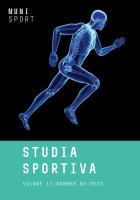Nutrition Periodization in Recreational Endurance Athletes During Training Camp – Case study
Nutrition Periodization in Recreational Endurance Athletes During Training Camp – Case study
Author(s): Michal Kumstát, Tomáš HlinskýSubject(s): Sports Studies
Published by: Masarykova univerzita nakladatelství
Keywords: nutrient timing; nutritional strategy; energy intake; carbohydrates
Summary/Abstract: Both training and dietary practices used by athletes greatly vary. Current sports nutrition guidelines promote dietary manipulation of energy-yielding nutrients specific to the period of training. The study explores the ad libitum nutrition practices of four healthy adult recreational athletes during a 2-week cycling training camp (~100 km·d-1, ~240 min·d-1) with particular attention to the current sports nutrition recommendations. Based on evidence-based guidelines, peri-exercise carbohydrate (CHO) and protein (PRO) intake periodization cut-off levels were set for athletes. Training days were categorized as hard (HARD, two training units/day), middle (MID, one training unit/day), and easy (LOW, no training). Fourteen-day diet records were used and analyzed by nutritional software for energy intake (EI), carbohydrate (CHO), and protein (PRO) intake.Relative daily EI of 78.6±4.5, 73.3±6.4, 75.4±8.2 kcal·kg·d-1, and CHO 8.9±0.8, 7.8±1.0, 8.2±1.5 g·kg1 intakes were not different in HARD, MID and LOW days, respectively. The mean daily EI was 1.3× higher than the predicted total daily energy expenditure, irrespective of the training day category, resulting in ~500 kcal·d-1 energy surplus. In the 2h post-exercise period, PRO intake exceeded the current recommendations 4.6-fold, and CHO intake was significantly lower after a second training session on HARD days (0.7 g·kg·h-1) than a recommendation (1.2 g·kg·h-1). Mean in-exercise CHO intake (~11.5 g·h-1) was significantly under the moderate 30 g·h-1 recommendation.In conclusion, the dietary behaviours of recreational athletes are not consistent with current sports nutrition periodization guidelines. Energy intake throughout the training camp led to positive energy balance being highest on non-training days. Daily or during and post-exercise CHO and PRO intakes were not adjusted to the training sessions' volume, intensity, or duration.
Journal: Studia sportiva
- Issue Year: 17/2023
- Issue No: 2
- Page Range: 16-29
- Page Count: 14
- Language: English

